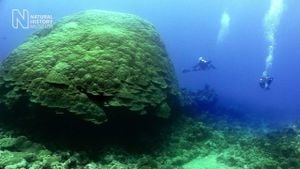Romania is currently witnessing one of its most surprising political campaigns yet, as nationalist candidate Calin Georgescu has emerged as a strong contender in the presidential election. With his unexpected success at the polls, Georgescu has set the stage for what could become one of the most significant political shifts since the country shed communism more than three decades ago.
This surprising turn of events has major implications not just for Romania but also for its role within NATO and its longstanding support for Ukraine against Russian aggression. With over 80% of ballots counted, Georgescu garnered about 22% of the vote, edging slightly past current Prime Minister Marcel Ciolacu, who received around 20%. This tight race suggests we could be heading for a runoff election on December 8, when Georgescu and Ciolacu will face off for political supremacy.
Georgescu's rise to prominence can largely be attributed to his innovative TikTok campaign which captured the attention of younger voters, embodying the shifting political terrain. His supporters flocked to him not just for conventional political promises but for his radical and somewhat controversial views. Georgescu has openly expressed admiration for Russian President Vladimir Putin, which has raised eyebrows across Europe and ignited debate about Romania’s foreign policy direction.
“Tonight the Romanian people shouted ‘peace’ and they were very loud,” Georgescu told his supporters triumphantly on Sunday evening, echoing sentiments he has consistently expressed throughout his campaign. His words suggest not just rhetoric, but also resonate with voters' desires for stability and peace, especially considering the tense geopolitical climate.
The nationalist, who stands at 62 years of age, is questioning the necessity of military support for Ukraine, proposing instead for Romania to reassess its NATO membership and its commitments to allied nations. Many voters are war-weary and increasingly skeptical of Western involvement, making Georgescu's message resonate with those worried about the long-term ramifications of the Ukraine conflict.
This election is particularly significant as it emerges alongside shifting tides in Washington. The return of former President Donald Trump to the White House could alter U.S. policy on Ukraine, which would inevitably filter down to Romania, considering the country’s strategic position as NATO's eastern flank. Romania shares the longest border with Ukraine among EU member states and has been directly impacted by the war, counting violation of airspace and debris from missile attacks as recent troubling experiences.
Ciolacu's position becomes more precarious through this lens. His government, formed from a coalition with the Liberal Party, was already under scrutiny after collapsing last month. Should Georgescu’s popularity keep building, the prime minister may face increasing pressures just days before general elections slated for December 1.
The prospect of having Georgescu as president poses not only practical questions for Romania's defense posture but also for its economic future. The Romanian economy is reeling from inflation and substantial social spending challenges, pushing the country's budget deficit to potentially become the widest within the EU this year. The next administration will need to navigate these fiscal hurdles amid rising social unrest and public dissatisfaction.
If the elections are any indication, this year could mark the beginning of renewed political turbulence. Romania, which recently experienced relative calm following years of political instability and turmoil, will now have to contend with the prospect of extreme, nationalist sentiment influencing national policy and direction.
Throughout this year, Romania has made important strides, making meaningful investments and moving past years of standing still. These efforts included addressing long-delayed projects involving infrastructure but potential control by nationalists could derail much of the progress made.
Georgescu's support is unmistakably linked to the younger generation, as they respond positively to his energetic onslaught on social media platforms. It has raised questions about the political strategy of established parties, serving as a case study on the shifting landscapes brought on by technology, especially platforms like TikTok.
While it's true the role of Romania’s president remains largely ceremonial, it holds considerable weight as the commander-in-chief of the military and as Romania’s representative at significant NATO and EU summits. Georgescu's presidency could alter this dynamic, leading Romania down a path he has so vigorously espoused during his campaign.
Should his policies be implemented, it’s reasonable to expect to see Romania drifting from the EU’s collective line on Ukraine and taking steps toward friendlier relations with Russia. This shift would mark a significant and potentially dangerous pivot from longstanding commitments to NATO’s collective security.
Amplifying concerns among international allies is the fact Georgescu has not shied away from stating his views publicly. Caught during the discussions about Russia’s regional intentions, he has echoes of skepticism about the overall Western strategy against Moscow, which directly contrasts with the current Romanian administration’s approach.
Next month’s run-off will undoubtedly become the focal point, not just for internal politics, but for external observers as well who’ve staked their interests on Romania’s continued alignmenty with NATO and EU policies.
Whether this election results in monumental change or simply provides temporary shockwaves hinges on voter turnout, especially among younger demographics rallied by Georgescu’s campaign maneuvers. With historical examples showcasing the youth’s power to swing elections, it begs the question: will they seize the moment or return to political apathy?
Romanian society stands at the crossroads, trying to define its identity amid conflicting pressures from within and outside its borders. How citizens choose to navigate the currents of nationalism, appeasement, and alliance commitments will shape longstanding legacies.



